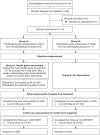Effectiveness of a Digital Health Game Intervention on Early Adolescent Smoking Refusal Self-Efficacy
- PMID: 38497462
- PMCID: PMC11193316
- DOI: 10.1177/10901981241237788
Effectiveness of a Digital Health Game Intervention on Early Adolescent Smoking Refusal Self-Efficacy
Abstract
Smoking poses a significant threat to adolescent health because of its immediate and long-term detrimental health effects. Smoking refusal self-efficacy predicts smoking behavior in adolescence. In adolescents' health education, digital interventions are potential tools to support smoking refusal self-efficacy. The aim of this two-arm cluster randomized controlled trial was to evaluate the effectiveness of a digital health game intervention compared with a no-intervention control group on smoking refusal self-efficacy in 10- to 13-year-old Finnish early adolescents. The early adolescents (n = 781) were randomized to the control group (n = 394) and the health game intervention group (n = 387). Smoking refusal self-efficacy, sources of smoking and snus refusal self-efficacy, and motivation to decline smoking and snus use in the future were measured at baseline, 2-week postintervention, and 3-month follow-up. Data were analyzed using linear mixed model and Wilcoxon rank-based test for clustered data. According to the results, the intervention group made improvements in sources of smoking and snus refusal self-efficacy between baseline and postintervention, and in sources of snus refusal self-efficacy between baseline and follow-up, compared with the control group. The intervention group showed improvements in smoking refusal self-efficacy among 12-year-olds between baseline and follow-up, and postintervention and follow-up compared with the control group. Similar improvements were also found among those with a smoking friend or a smoking parent between postintervention and follow-up. The results were promising for the use of digital health game interventions to promote early adolescent smoking refusal self-efficacy and preventing smoking experimentation. Further research can evaluate the long-term effects for adolescents.
Keywords: adolescent health; adolescents; digital health; health behavior; health education; health games.
Conflict of interest statement
Declaration of Conflicting InterestsThe author(s) declared no potential conflicts of interest with respect to the research, authorship, and/or publication of this article.
Figures
Similar articles
-
Feasibility of mobile health game "Fume" in supporting tobacco-related health literacy among early adolescents: A three-armed cluster randomized design.Int J Med Inform. 2018 May;113:26-37. doi: 10.1016/j.ijmedinf.2018.02.013. Epub 2018 Mar 15. Int J Med Inform. 2018. PMID: 29602430 Clinical Trial.
-
Systematic review of digital interventions to support refusal self-efficacy in child and adolescent health promotion.Health Promot Int. 2022 Oct 1;37(5):daac085. doi: 10.1093/heapro/daac085. Health Promot Int. 2022. PMID: 36166268 Free PMC article.
-
A Web-based computer-tailored game to reduce binge drinking among 16 to 18 year old Dutch adolescents: development and study protocol.BMC Public Health. 2014 Oct 9;14:1054. doi: 10.1186/1471-2458-14-1054. BMC Public Health. 2014. PMID: 25301695 Free PMC article. Clinical Trial.
-
Refusal self efficacy, self esteem, smoking refusal skills and water pipe (Hookah) smoking among iranian male adolescents.Asian Pac J Cancer Prev. 2013;14(12):7283-8. doi: 10.7314/apjcp.2013.14.12.7283. Asian Pac J Cancer Prev. 2013. PMID: 24460289
-
Efficacy of the Virtual Reality Intervention VR FestLab on Alcohol Refusal Self-Efficacy: A Cluster-Randomized Controlled Trial.Int J Environ Res Public Health. 2022 Mar 10;19(6):3293. doi: 10.3390/ijerph19063293. Int J Environ Res Public Health. 2022. PMID: 35328977 Free PMC article. Clinical Trial.
Cited by
-
Game-Based Digital Interventions for Enhancing Positive Development and Addressing Substance Use in Adolescents: A Systematic Review.Children (Basel). 2024 Dec 21;11(12):1554. doi: 10.3390/children11121554. Children (Basel). 2024. PMID: 39767983 Free PMC article. Review.
References
-
- Bandura A. (1997). Self-efficacy: The exercise of control. W.H. Freeman and Company.
-
- Baranowski T., Blumberg F., Buday R., DeSmet A., Fielling L. E., Green S., Kato P. M., Lu A. M., Maloney A. E., Mellecker R., Morrill B. A., Peng W., Shegog R., Simons M., Staiano A. E., Thompson D., Young K. (2016). Games for health for children: Current status and needed research. Games for Health Journal, 5(1), 1–12. 10.1089/g4h.2015.0026 - DOI - PMC - PubMed
-
- Boyle E., Connolly T. M., Hainey T. (2011). The role of psychology in understanding the impact of computer games. Entertainment Computing, 2(2), 69–74. 10.1016/j.entcom.2010.12.002 - DOI
Publication types
MeSH terms
LinkOut - more resources
Full Text Sources
Medical


